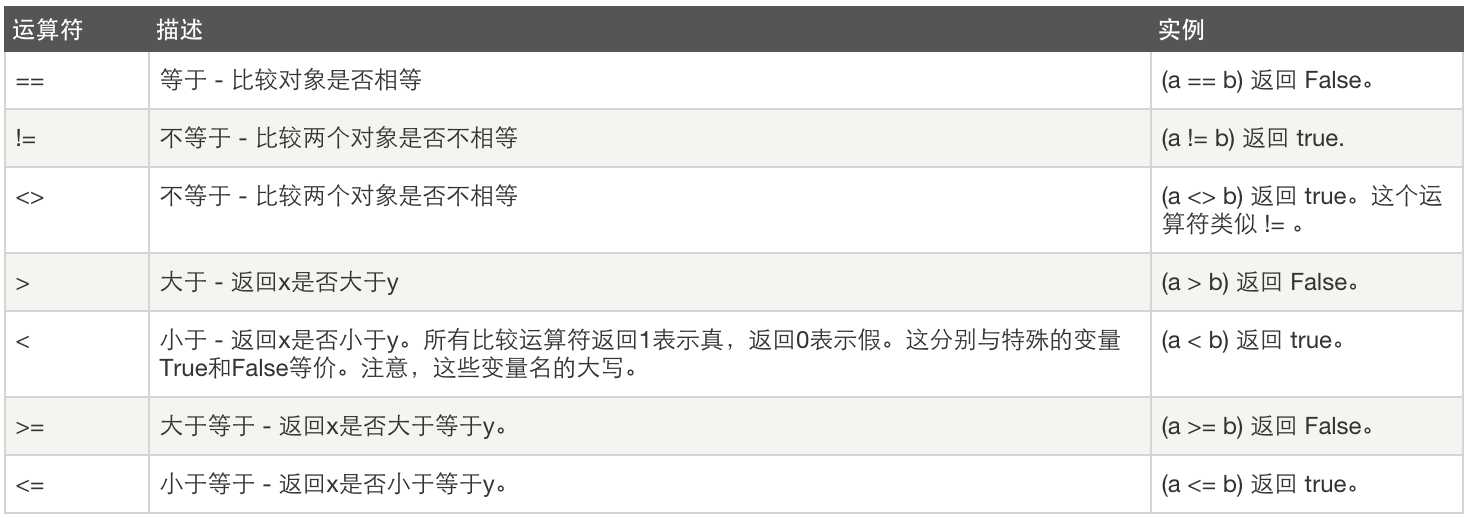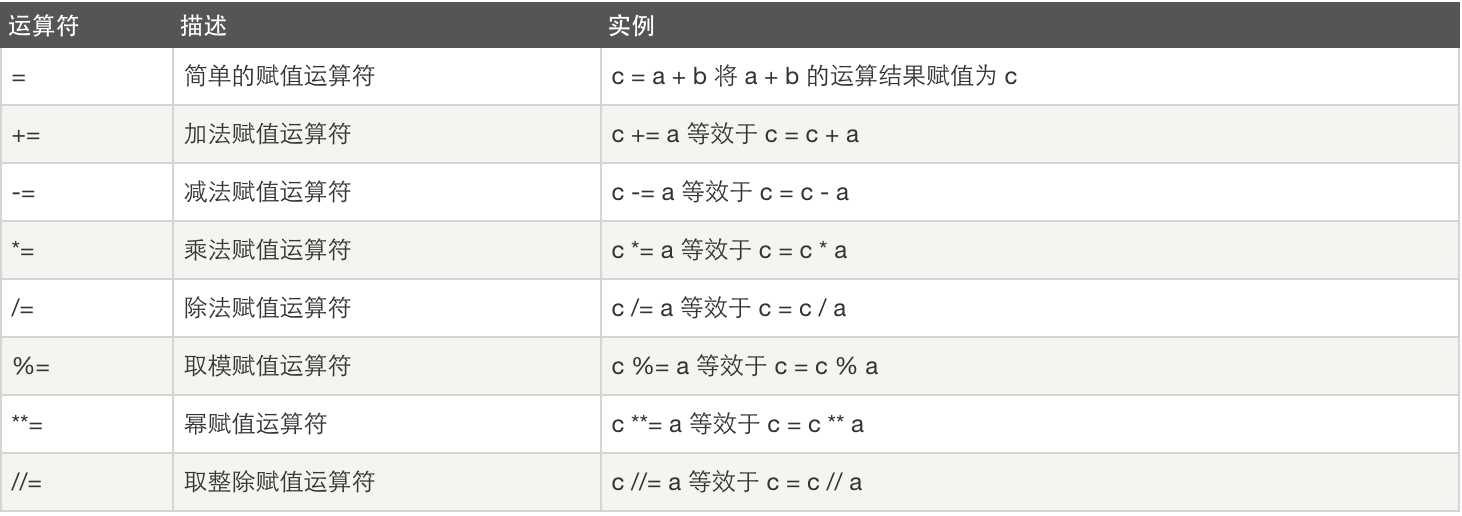标签:empty idt height indicator image table 数据类型 32位 元素

2、比较运算:

3、赋值运算:

4、逻辑运算:

5、成员运算:

int(整型)
 int
int"hello world"
 str
str|
1
2
3
|
name_list = [‘alex‘, ‘seven‘, ‘eric‘]或name_list = list([‘alex‘, ‘seven‘, ‘eric‘]) |
基本操作:
 list
list|
1
2
3
|
ages = (11, 22, 33, 44, 55)或ages = tuple((11, 22, 33, 44, 55)) |

lass tuple(object):
"""
tuple() -> empty tuple
tuple(iterable) -> tuple initialized from iterable‘s items
If the argument is a tuple, the return value is the same object.
"""
def count(self, value): # real signature unknown; restored from __doc__
""" T.count(value) -> integer -- return number of occurrences of value """
return 0
def index(self, value, start=None, stop=None): # real signature unknown; restored from __doc__
"""
T.index(value, [start, [stop]]) -> integer -- return first index of value.
Raises ValueError if the value is not present.
"""
return 0
def __add__(self, y): # real signature unknown; restored from __doc__
""" x.__add__(y) <==> x+y """
pass
def __contains__(self, y): # real signature unknown; restored from __doc__
""" x.__contains__(y) <==> y in x """
pass
def __eq__(self, y): # real signature unknown; restored from __doc__
""" x.__eq__(y) <==> x==y """
pass
def __getattribute__(self, name): # real signature unknown; restored from __doc__
""" x.__getattribute__(‘name‘) <==> x.name """
pass
def __getitem__(self, y): # real signature unknown; restored from __doc__
""" x.__getitem__(y) <==> x[y] """
pass
def __getnewargs__(self, *args, **kwargs): # real signature unknown
pass
def __getslice__(self, i, j): # real signature unknown; restored from __doc__
"""
x.__getslice__(i, j) <==> x[i:j]
Use of negative indices is not supported.
"""
pass
def __ge__(self, y): # real signature unknown; restored from __doc__
""" x.__ge__(y) <==> x>=y """
pass
def __gt__(self, y): # real signature unknown; restored from __doc__
""" x.__gt__(y) <==> x>y """
pass
def __hash__(self): # real signature unknown; restored from __doc__
""" x.__hash__() <==> hash(x) """
pass
def __init__(self, seq=()): # known special case of tuple.__init__
"""
tuple() -> empty tuple
tuple(iterable) -> tuple initialized from iterable‘s items
If the argument is a tuple, the return value is the same object.
# (copied from class doc)
"""
pass
def __iter__(self): # real signature unknown; restored from __doc__
""" x.__iter__() <==> iter(x) """
pass
def __len__(self): # real signature unknown; restored from __doc__
""" x.__len__() <==> len(x) """
pass
def __le__(self, y): # real signature unknown; restored from __doc__
""" x.__le__(y) <==> x<=y """
pass
def __lt__(self, y): # real signature unknown; restored from __doc__
""" x.__lt__(y) <==> x<y """
pass
def __mul__(self, n): # real signature unknown; restored from __doc__
""" x.__mul__(n) <==> x*n """
pass
@staticmethod # known case of __new__
def __new__(S, *more): # real signature unknown; restored from __doc__
""" T.__new__(S, ...) -> a new object with type S, a subtype of T """
pass
def __ne__(self, y): # real signature unknown; restored from __doc__
""" x.__ne__(y) <==> x!=y """
pass
def __repr__(self): # real signature unknown; restored from __doc__
""" x.__repr__() <==> repr(x) """
pass
def __rmul__(self, n): # real signature unknown; restored from __doc__
""" x.__rmul__(n) <==> n*x """
pass
def __sizeof__(self): # real signature unknown; restored from __doc__
""" T.__sizeof__() -- size of T in memory, in bytes """
pass
|
1
2
3
|
person = {"name": "mr.wu", ‘age‘: 18}或person = dict({"name": "mr.wu", ‘age‘: 18}) |
常用操作:
 dict
dict|
1
2
3
|
li = [11,22,33,44]for item in li: print item |
|
1
2
3
|
li = [11,22,33]for k,v in enumerate(li, 1): print(k,v) |
|
1
2
3
4
5
6
7
8
|
print range(1, 10)# 结果:[1, 2, 3, 4, 5, 6, 7, 8, 9]print range(1, 10, 2)# 结果:[1, 3, 5, 7, 9]print range(30, 0, -2)# 结果:[30, 28, 26, 24, 22, 20, 18, 16, 14, 12, 10, 8, 6, 4, 2] |
一、元素分类
有如下值集合 [11,22,33,44,55,66,77,88,99,90...],将所有大于 66 的值保存至字典的第一个key中,将小于 66 的值保存至第二个key的值中。
即: {‘k1‘: 大于66的所有值, ‘k2‘: 小于66的所有值}
功能要求:
|
1
2
3
4
5
6
|
goods = [ {"name": "电脑", "price": 1999}, {"name": "鼠标", "price": 10}, {"name": "游艇", "price": 20}, {"name": "美女", "price": 998},] |
五、用户交互,显示省市县三级联动的选择
|
1
2
3
4
5
6
7
8
9
10
11
12
13
|
dic = { "河北": { "石家庄": ["鹿泉", "藁城", "元氏"], "邯郸": ["永年", "涉县", "磁县"], } "河南": { ... } "山西": { ... }} |
Python开发【全栈-DAY-IV】:Python基本数据类型
标签:empty idt height indicator image table 数据类型 32位 元素
原文地址:http://www.cnblogs.com/adidasyang/p/6023412.html